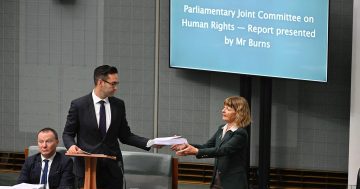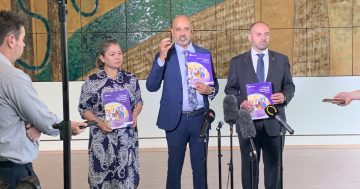
Race Discrimination Commissioner Giridharan Sivaraman has delivered his interim report into racism at Australian universities. Photo: Supplied.
Concerns over the increasing incidence of racism experienced by students and staff on university campuses across the country have been highlighted in an Australian Human Rights Commission study.
The commission’s interim report on racism at Australian universities underlines a range of worrying issues and experiences during work and/or study.
The Federal Government tasked the commission to undertake the study this year and update the parliament on its progress.
The project’s interim report, Respect at Uni, also indicates dissatisfaction with how some universities handle complaints.
Race Discrimination Commissioner Giridharan Sivaraman said one of the catalysts of the project was the need to respond to the “alarming increase in antisemitism on university campuses” over the last 12 months, which remained a key concern for the Jewish staff and students consulted.
“The commission has heard both interpersonal and structural racism are pervasive and deeply entrenched at universities,” he said.
“Racism impacts different communities in different ways, including Jewish, Muslim, Palestinian and Arab students and staff.
“It has a profoundly negative impact on First Nations students and staff.”
Mr Sivaraman said students shared their experiences of racism, which left them feeling unsafe and unwelcome and affected their engagement and performance at university.
“Staff told us about feeling ‘othered’ and less confident expressing their opinions or identity, with high levels of casual employment and a hierarchical academic structure compounding these issues,” he said.
“Themes emerging from our consultations so far include the diverse nature of staff and student experiences of racism at universities, their dissatisfaction with complaints mechanisms, the disconnect between universities’ policies on racism and their practice, and the challenge of finding a common language and understanding around racism.
“Initial consultations also revealed low racial literacy – the ability to name, understand and confront racism – as a key obstacle to anti-racism efforts across universities.”
Mr Sivaraman said that at this intermediate stage in the study, it was clear that a significant amount of work was required across the tertiary education sector to address racism and increase respect at universities.
“We’ll be making recommendations for reform in our final report next year.”
Highlights of the study’s interim report:
- Jewish students and staff reported increased incidents of antisemitism following protests on campuses from October 2023 through to the present. Some felt unsafe attending lectures; others expressed concerns about intimidation, exclusion and extremist propaganda such as neo-Nazi-linked posters. Jewish students felt universities did not adequately address their safety concerns with some Jewish groups calling for a specific approach to address antisemitism on campuses. Others thought it could be addressed through broader anti-racism efforts.
- Palestinian, Arab and Muslim students and staff described experiences of exclusion, hostility, threats and a conflation of their disparate experiences. Concerns were raised about academic repercussions for speaking out, as well as discriminatory actions such as the closure of prayer spaces and restrictions on symbols of cultural expression, such as keffiyehs and Palestinian flags.
- Indigenous students and staff described facing significant structural and interpersonal racism, compounding longstanding inequities in the sector. Achievements by First Nations students and staff are often undermined by being characterised as ‘special treatment’ rather than a result of merit. Limited understanding of the historical and systemic discrimination faced by First Nations people and ongoing experiences of racism were noted as barriers to participation by students and staff.
- Students and staff from African backgrounds described frequent and severe incidents of racism, as well as feeling the need to moderate their behaviour to avoid being seen as an ‘angry Black person’. Students and staff from Asian backgrounds also shared experiences of overt and systemic racism.
- International students reported experiences of exclusion, a lack of social support, and difficulty finding adequate guidance and assistance. International students also shared stories of feeling unwelcome and viewed as a commodity or ‘cash cow’ for universities and expressed fear of reporting incidents of racism and discrimination, worried that doing so may compromise their visas and lead to their deportation.
The Respect at Uni project has established a whole-of-government senior officers working group and an independent, expert advisory committee comprised of representatives from relevant communities and the university sector.
Project staff have been recruited and the parameters, methodology and governance of the study developed.
The commission has conducted initial consultations with relevant tertiary education organisations as well as groups representing diverse cultural communities including people from First Nations, Jewish, Muslim and other negatively racialised communities.
It has also delivered an initial literature review of content relevant to the study.
The study’s next phase starts this month and includes a series of focus groups as well as a comprehensive survey of university staff and students from across Australia.
A final report containing relevant recommendations is scheduled to be delivered to the government in June 2025.
Original Article published by Chris Johnson on Riotact.







